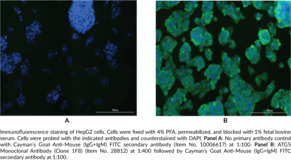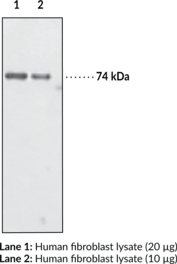Description
Autophagy-related 5 (ATG5), formerly known as apoptosis-specific protein (ASP), is a protein that is essential to autophagosome elongation.{47096,47097,47098} ATG5 is covalently conjugated to the C-terminal glycine residue of ATG12 (ATG12-ATG5) and forms a non-covalent complex with ATG16 (ATG12-ATG5-ATG16), which functions as an E3 ubiquitin ligase-like enzyme to facilitate LC3 transfer from ATG3 to phosphatidylethanolamine in canonical autophagy. ATG12-ATG5 also binds to the ATG12-ATG5-interaction region of the lysosomally localized protein TECPR1, freeing the TECPR1 pleckstrin homology domain to interact with phosphatidylinositol 3-phosphate components in the autophagosome membrane, promoting autophagosome-lysosome fusion.{47098} Polymorphisms in ATG5 have been associated with various autoimmune diseases, including lupus nephritis and Behçet’s disease, gastrointestinal and colorectal cancers, as well as sporadic Parkinson’s disease and childhood asthma. Cayman’s ATG5 Monoclonal Antibody (Clone 1F8) can be used for ELISA and immunofluorescence applications.
Synonyms: APG5-like|Apoptosis-specific Protein|Autophagy Protein 5|Autophagy-related 5|hAPG5
Immunogen: Full-length human recombinant ATG5 protein
Formulation: 100 µg Protein G-purified monoclonal antibody
Isotype: IgG1
Applications: ELISA and IF
Origin:
Stability: 365 days
Application|ELISA||Application|Immunocytochemistry||Application|Immunofluorescence||Application|Immunohistochemistry||Product Type|Antibodies|Monoclonal Antibodies||Research Area|Cancer|Autophagy||Research Area|Cell Biology|Endomembrane System & Vesicular Trafficking|Autophagy||Research Area|Immunology & Inflammation|Autoimmunity|Lupus||Research Area|Immunology & Inflammation|Pulmonary Diseases|Asthma||Research Area|Neuroscience|Neurodegenerative Disorders|Parkinson’s Disease


